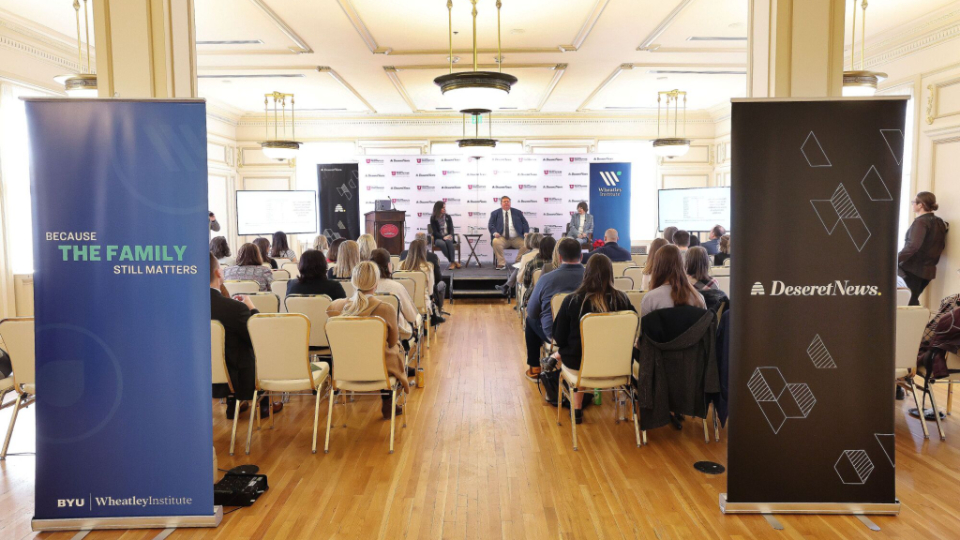
AFS-2023
Mallory Bateman, director of demographic research for the Gardner Policy Institute, left; Jeremy Pope, Wheatley Institute fellow and BYU professor, center; and Deseret News family reporter Lois Collins, right, speak during a panel discussion at the Gardner Policy Institute in Salt Lake City, Utah, on Tuesday, December 12, 2023. The Deseret News hosted the panel discussion focused on the 2023 findings of the ninth annual American Family Survey. Photo by Jeffrey D. Allred, courtesy of Church News.Copyright 2023 Deseret News Publishing Company.This story appears here courtesy of TheChurchNews.com. It is not for use by other media.
By Kaitlyn Bancroft, Church News
Over a quarter of people say the most important problems facing their families are mental or physical challenges.
More than a third of people say they’re unsure if the nation’s declining fertility rate is a good or bad thing.
And close to half of parents with children ages 10 through 18 say they worry at least sometimes about what their kids see online.
These are just a few findings from the American Family Survey 2023, an annual, nationwide study of 3,000 Americans conducted by YouGov for the Deseret News and Brigham Young University’s Wheatley Institute.
Jeremy Pope, one of the survey’s principle investigators and a political science professor at BYU, spoke Tuesday, December 12 during a panel discussion on the American Family Survey, now in its ninth year.
Held at the Kem C. Gardner Policy Institute in Salt Lake City, Utah, the panel also included Mallory Bateman, the Institute’s director of demographic research; and Deseret News family reporter Lois Collins.
Here are some of the survey topics they highlighted during the panel discussion.
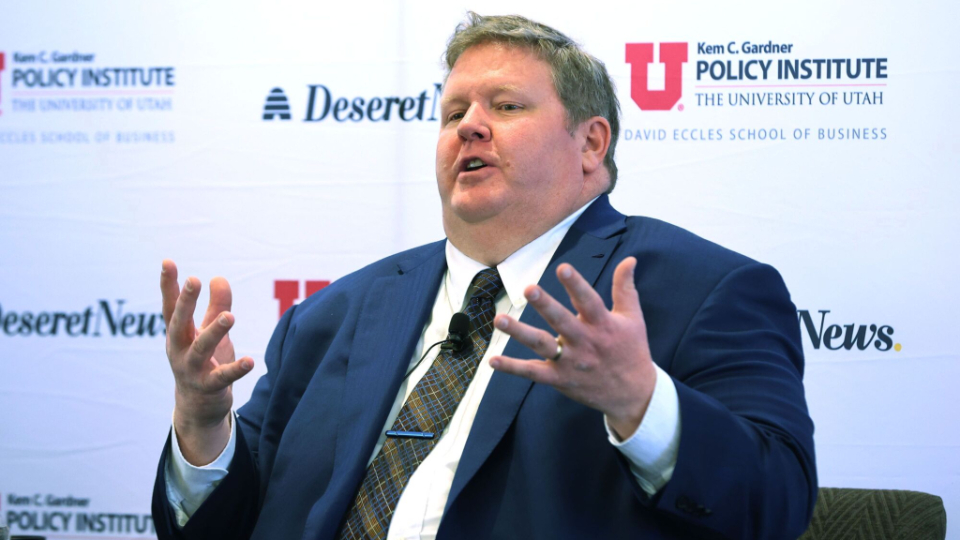
AFS-2023
Jeremy Pope, Wheatley Institute fellow and BYU professor, speaks during a panel discussion at the Kem C. Gardner Policy Institute in Salt Lake City, Utah, on Tuesday, December 12, 2023. The Deseret News, along with the Wheatley Institute and Kem C. Gardner Policy Institute, hosted a panel discussion focused on the 2023 findings of the ninth annual American Family Survey. Photo by Jeffrey D. Allred, courtesy of Church News.Copyright 2023 Deseret News Publishing Company.Mental Health
Pope said that this year, for the first time, the survey asked respondents the most important challenges their families are facing.
The highest category, at 29%, was mental or physical health challenges. This was followed by difficulty finding quality family time (23%), high work demands or stress on parents (22.6%), the costs of raising a family (22%) and tensions or disagreements between family members (20%).
Conversely, when asked what the biggest problem facing other families is, 33% of respondents said it’s the costs of raising a family. This was followed by social media, video games and other technology (27%); high work demands or stress on parents (27%); children growing up without two parents (24%); and mental or physical health challenges (20%).
“One of the things that we noticed on this survey is [mental and physical health] really tops as the thing that people see as a problem with their family. ... And it turns out that people will say this about their family, although they’re less likely to say it [about other families],” Pope said.
He clarified that the survey did not ask respondents separately about physical and mental health, instead putting them in the same question.
The survey also asked respondents what the most important issue facing teenagers is. 40% said mental health; 39% said overuse of technology; 29% said bullying; 24% said pressure to use drugs or alcohol; and 21% said divorce or family breakdowns.
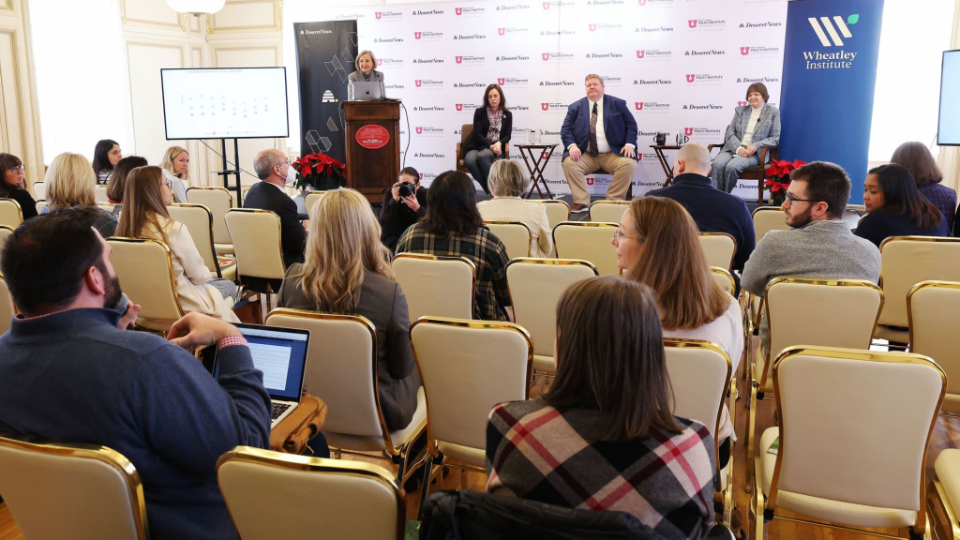
AFS-2023
Mallory Bateman, director of demographic research for the Gardner Policy Institute, second from left; Jeremy Pope, Wheatley Institute fellow and BYU professor, second from right; and Deseret News family reporter Lois Collins, right, speak during a panel discussion at the Gardner Policy Institute in Salt Lake City, Utah, on Tuesday, December 12, 2023. Photo by Jeffrey D. Allred, courtesy of Church News.Copyright 2023 Deseret News Publishing Company.Social Media
The survey found that 40% of parents with children ages 10 through 18 worry at least sometimes about what their children see online.
Other responses on what children see online, 22% said they frequently worry; 13% said they always worry; 19% said they rarely worry; and 5% said they never worry.
In a similar question but about what children post online, 40% of parents also said they worry sometimes about what their children post online. 28% said they frequently worry about this; 13% said they always worry; 16% said they rarely worry; and 21% said they never worry.
The survey also found that social media use among teens is nearly universal — 96% of parents said their kids have access to at least one social media platform.
- 66% of parents said their children use Instagram.
- 63% said TikTok.
- 61% said YouTube.
- 57% said Facebook.
- 51% said Snapchat.
- 31% said Twitter.
- 16% said Pinterest.
- 4% said BeReal.
- 3% said they don’t know which social media platforms their children use.
Additionally, 36% of parents worried about time spent online said they place time restrictions on their children, while 35% of parents worried about phishing and cybersecurity said their children’s social media accounts are private, 28% of parents worried about inappropriate content online said they place content restrictions on their children, and 26% of parents who are worried about online predators said they place contact restrictions on their children.
The survey also broke down specific device restrictions.
- 38% of parents said they place content restrictions on their children’s devices.
- 28% said they restrict private messaging.
- 27% said their children’s social media accounts are private.
- 26% said they set contact restriction.
- 25% said they set screen-time restrictions.
Also, 34% said they place no restrictions on their children; while 69% said they want government restrictions.
Collins said she’s written a number of stories on social media-related issues, and her impression after talking to a variety of families and experts is that “everybody feels like they should be doing something and they should be managing [social media] better, but they’re not quite sure how to do that.”
And when it comes to potential government regulations, Pope said people often imagine a “unicorn government” fixing everything with the wave of a magic wand.
“But that’s not terribly realistic,” he said.
The survey made several other social-media related findings:
- 66% of parents said they follow their children online.
- 48% said they have the usernames and passwords to their kids’ social media accounts.
- 47% said they check their kids’ social media accounts at least once a week.
- 38% said they’re in favor of suing social media companies.
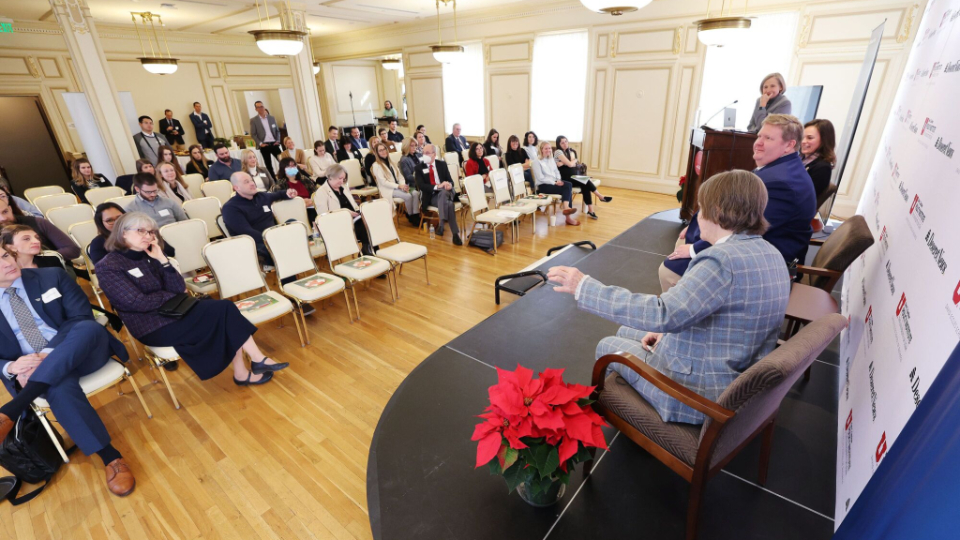
AFS-2023
Mallory Bateman, director of demographic research for the Gardner Policy Institute second from right; Jeremy Pope, Wheatley Institute fellow and BYU professor, second from left; and Deseret News family reporter Lois Collins, left, speak during a panel discussion at the Gardner Policy Institute in Salt Lake City, Utah, on Tuesday, December 12, 2023. Photo by Jeffrey D. Allred, courtesy of Church News.Copyright 2023 Deseret News Publishing Company.Marriage
Another section of the survey explored people’s attitudes about marriage. On a weighted scale from 0.0 to 1.0, people who attend church at least once a week report the highest approval of marriage, landing above 0.75 on the scale.
The groups that next approve marriage most highly are Republicans (above 0.75), people without college degrees (above 0.50) and Black people (above 0.50).
Conversely, the groups that disapprove most strongly of marriage are those who never attend church (below 0.25), Democrats (below 0.50) and those with an income under $40,000 a year (below 0.50).
Pope said he recognizes that there are plenty of bad marriages in the world, and that many people have legitimate reasons for not being married.
However, “It’s worrisome that the [political] left is sort of drawing back away from marriage. That, I think, is a storm cloud on the horizon we should be concerned about.”
But people on the political right aren’t off the hook, he said.
“Republicans have a lot of talk about how marriage is really, really important, but when it comes time to... support marriages in ways that involve spending money, they are very reluctant to do that,” Pope said.
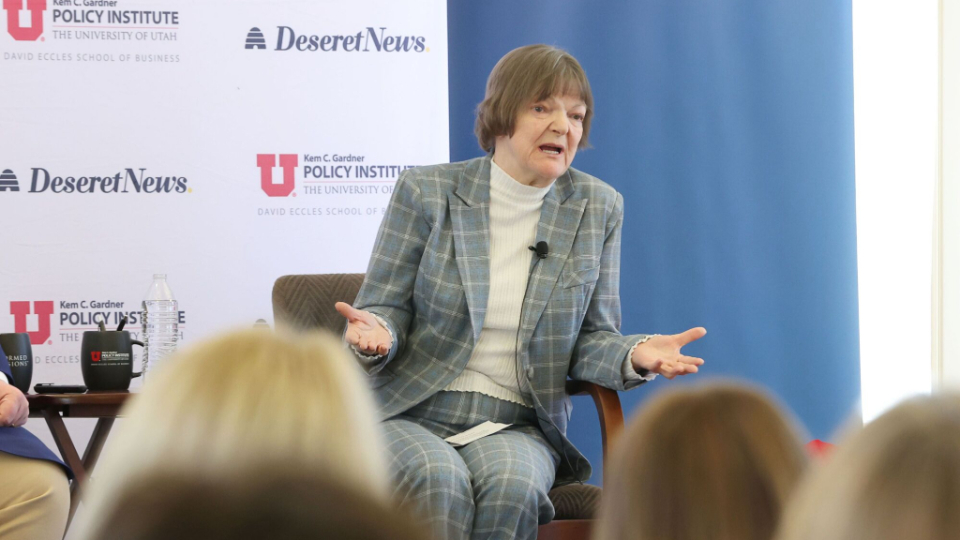
AFS-2023
Deseret News family reporter Lois Collins speaks during a panel discussion in Salt Lake City, Utah, on Tuesday, December 12, 2023. The Deseret News, along with the Wheatley Institute and Kem C. Gardner Policy Institute, hosted a panel discussion focused on the 2023 findings of the ninth annual American Family Survey. Photo by Jeffrey D. Allred, courtesy of Church News.Copyright 2023 Deseret News Publishing Company.Fertility Rates
The survey cites data from the United Nations’ World Population Prospects report, showing that fertility rates both in the U.S. and worldwide have decreased dramatically between the 1950s and now.
When survey respondents were asked how they felt about this data, 24.5% said declining fertility is a good thing, 37.5% said it’s a bad thing and 38% were unsure if it’s good or bad.
The survey found little evidence that these attitudes differed by age or whether respondents were parents.
However, 43% of men versus 32% of women said they think declining fertility is bad for the nation; while 44% of women versus 32% of men said they’re ambivalent.
Pope said older people tend to think that younger people are waiting too long to have children, while younger people don’t think they’re waiting too long at all.
“I don’t know that people who are waiting to have children are necessarily being unreasonable,” Pope said, “but I do sometimes worry that they may be underestimating the difficulty of having children later.”
Collins said she has daughters who are “prime fertility age.” When she speaks to them and their friends about their life plans, they often ask how they can start families when they can’t afford homes and other basic needs.
“I talk to a lot of young people who don’t know that they will ever have children because they don’t see the opportunity economically to do that,” she said.
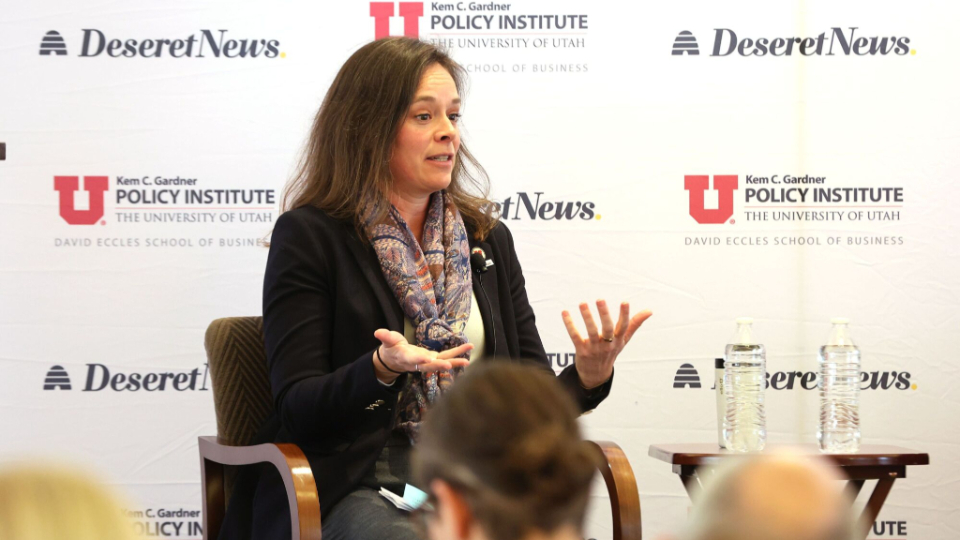
AFS-2023
Mallory Bateman, director of demographic research for the Kem C. Gardner Policy Institute, speaks during a panel discussion at the institute in Salt Lake City, Utah, on Tuesday, December 12, 2023. Photo by Jeffrey D. Allred, courtesy of Church News.Copyright 2023 Deseret News Publishing Company.Living in the Middle
Bateman said what she found most interesting about the survey “is how happy people are with their own families and how they’re a little bit unsure that other families are doing as well as they are.”
While the researchers heard many opinions from people on either extreme of the political spectrum, most people live somewhere in the middle, she said.
“I believe collaboration and cooperation and sharing [are] possible,” Bateman said, “and I think that is really interesting, that the survey also reflected that.”